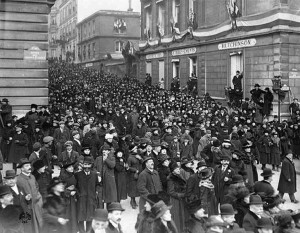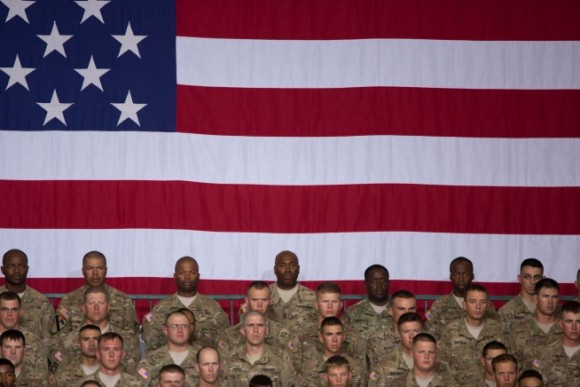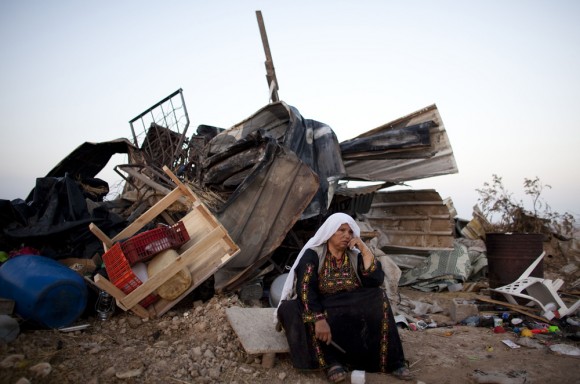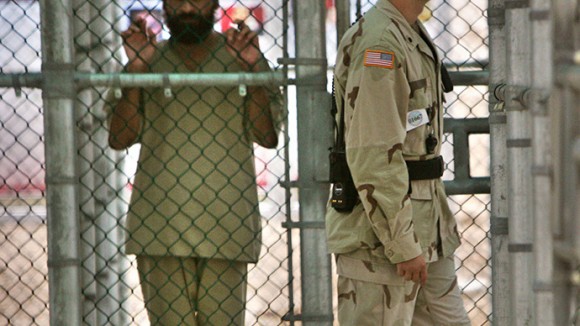 The British and the Canadians call today Remembrance Day, or Armistice Day. In the United States, it’s been known as Veterans Day since the end of the Korean War. Americans are much more divorced from WWI than people in Europe or Canada. Understandable, since the conflict never touched our soil, and it killed “only” 125,000 men in less than two years.
The British and the Canadians call today Remembrance Day, or Armistice Day. In the United States, it’s been known as Veterans Day since the end of the Korean War. Americans are much more divorced from WWI than people in Europe or Canada. Understandable, since the conflict never touched our soil, and it killed “only” 125,000 men in less than two years.
Today Veterans Day is an excuse to salute living veterans of various wars, and to thank them all. But never mind what the calendar says, we should keep calling it Armistice Day. Because that’s what happened on November 11 — World War One endd.
It’s not as if when the U.S. called it Armistice Day, it was a peacenik’s holiday. No holiday officially mandated by President Woodrow Wilson could ever be that. But all the same, the switch — signed by President Dwight Eisenhower, after a WWII veteran rallied for it — to a day for all veterans suggests a diminishing amount of critical thought about the meaning of the holiday. Or, at least an end to more peaceful platitudes and a drift towards more dangerous ones.
World War I was a terrible thing. Its existence assured the world of a second, much worse conflict. The Treaty of Versailles’s draconian terms hit Germany with blame for everything. Hyperinflation, depression, and resentment paved a road to Hitler. But on November 11, 1918, the war stopped. A war ending — one particular war that included particular, real men is something worth celebrating and considering. Because what is being celebrated on Veterans Day is an abstraction. Nobody is thanking of the individuals who may have been well-intentioned, and then changed their minds. Not the ones who were aching to play warrior, or the ones who had limited economic opportunities. Definitely not the ones who came back with PTSD-addled brains, or antiwar ideas.
Today is not the day to remember how the armed forces aren’t dealing with what they’ve made. Individuals in society may want soldiers to have medical care, and they definitely want to salute them in parades. They will happily change their Facebook statuses to “thank you” today. But nobody really wants to deal with what happens after wars — with skyrocketing suicide rates or traumatic brain injuries in Americans. The other side of our wars won’t even get a mention today, and the numbers of dead are a hell of a lot higher there.
One exception to the fever of banal kindness is Justin Doolittle’s Salon essay headlined “Stop thanking the troops for me.” At one point in the piece, he notes that sporting events often involve explicitly pro-military raw-raw rabble-rousing. Even sports advertising is closely tied with heart-warming military ads. One example is the Bank of America ad that played incessantly during baseball season.
“Bank of America and the Hughes family” tells us about Caroline Hughes, William Hughes, John Hughes Jr, John Anderson Hughes, and Robert Hughes who have served in Haiti, Vietnam, World War II (specifically Normandy), World War I (cavalry), and the Spanish-American war. A long line of folks all in the U.S. military, with the artifacts and the photographs to prove it.
This is a very tidy version of a popular idea, mainly among the more conservative, that all soldiers should be praised. But it doesn’t even gel with professed conservative ideals.
Conservatives hate false “equality.” Capitalism rewards ingenuity and drive. The clunky hand of the state just hands out cash. Liberals want everyone to have a participation trophy, and nobody to get unfair benefits. Conservatives want hard work, winners and losers, and pulling yourself up by your boot straps. So why so they constantly reaffirm this notion that to serve your country is noble, regardless of the conflict or its effects on the rest of the world? Why is war — the biggest state endevour there is — the time to turn your politics into a bumper sticker and a ribbon?
“Supporting the military, though, and expressing gratitude for what the military is actually doing around the world, are nothing if not explicitly political sentiments,”writes Doolitttle. It’s true. What are you thanking each soldier for if not for what they do, and what they are a part of? Are we supposed to ignore blowback, and the disastrous state of Iraq, and the continued occupation of Afghanistan when we thank soldiers? Are we supposed to forget the insanity of Vietnam, and the civilian bombings during WWII?
Even World War I shouldn’t be seen as 1000 years ago, with all of its idiotic, wasteful carnage now just restful poems about poppies. World War I was a disaster, too. Maybe more than most wars. Why are we trying to forget that it ended today? Why has thanking replaced remembering?
This is a sincere question for conservatives and Republicans and anyone who would frame wars the way the silly Bank of America ad does — if every war is equally noble, which one is the good war? If beating Hitler is losing in Vietnam, is 600,000 dead at the Somme is remembering the Maine, why should we ever believe anyone swearing that this time it’s really Munich in 1938, and we can’t afford to stand down from [Insert International Threat Here]? The warmongerers cry wolf every time. A good way to prove that is to pretend that every war and every soldier is the same, so every war must be the one we just have to fight.
War is life and death. Even one — or two — days a year, we cannot afford to treat it like an apolitical platitude. Don’t blame individual soldiers, but don’t thank them either.
Instead, think about November 11 and think about the end of a war.







